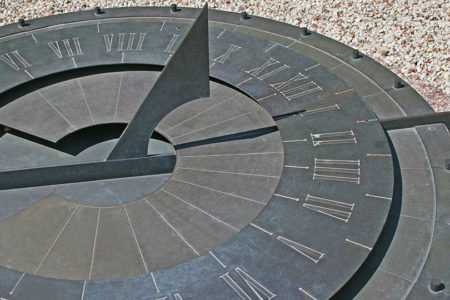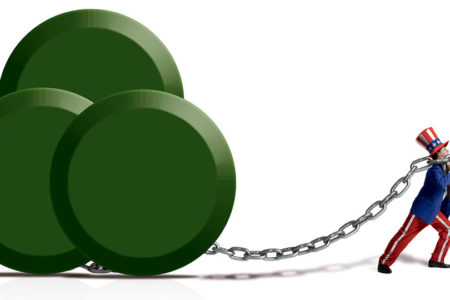Security on the Island of Grace
Last July in Madrid, Spain, King Abdullah of Saudi Arabia spoke before what many in the ecumenical world hailed as a glittering array of religious luminaries. The conference was termed historic, not only because it was convened by a Muslim king from the most religiously intolerant country in the world, but because it included (along with the usual World Council of Churches representatives) a mixture of just about everything.
There was a Jewish rabbi; some “evangelical” leaders and mainline liberal lobbyists for interreligious dialogue; and a cadre of Hindus, Buddhists, Sikhs, Zoroastrians, and the like.
The 300-plus boosters of religious “inclusivism” might have passed with no more than a nod and a “here they go again” had it not been for a defining statement by Abdullah in his opening remarks: “We all believe in one God, who sent messengers for the good of humanity in this world and the hereafter.”
Perhaps in the past, even that statement would hardly have been worth noting. But in the current bog of moral and religious incoherency, Abdullah’s point of view is now finding a home in what may loosely be termed evangelical circles.
The Not-So-New Social Gospel
What was coined the Social Gospel came on the scene in the late 19th and early 20th centuries when prominent liberals, such as Harry Emerson Fosdick, a Baptist minister, joined liberal theologians in the Presbyterian Church in New York City. Together they questioned the inerrancy of Scripture and the validity of such traditional doctrines as the virgin birth, substi-utionary atonement, and the literal Second Coming of Christ. In their view, modern scientific evidences pointed to the contrary.
This turn away from the fundamentals of the faith was embellished by the advocates of higher criticism and promoted by Charles A. Briggs, a professor of biblical theology who deduced “definitively” that (1) Moses did not write the Pentateuch, (2) the Old Testament prophets did not write the books ascribed to them, (3) King David wrote only a few of the psalms, (4) the Bible as a whole is riddled with errors, and (5) scriptural inerrancy “is a ghost of modern evangelicalism to frighten children.”
The Bible, Briggs said, has no authority to transmit absolutes; and he called on fellow rationalists to join him in sweeping away the dead orthodoxy of the past and working for the unity of the entire church.
After nullifying the Scriptures as an unreliable relic, liberals had no viable biblical message to proclaim. So they turned to what they felt were the “profound concerns about the role of Christianity in the culture and how that role was to be expressed.” The result was the Social Gospel, described as an intellectual movement dedicated to ameliorating the social problems of poverty, inequality, crime, racial tensions, slums, bad hygiene, poor schools, and the dangers of war. In addition to being theologically bankrupt, Social Gospel leaders were also predominately liberal politically.
In the end, Christianity in America and the West became divided into two main religious categories thereafter designated as (1) “mainline Christianity” (liberal) and (2) “evangelical” or “fundamentalist” (orthodox/conservative).
Today’s growing propensity in certain segments of modern evangelicalism to turn away from the methods and message of the faith and become more assimilated into the culture, more intertwined with other religions, and less rigid in the interpretation of Scripture may be a blueprint of the future of the American church. But it most certainly will not be something that hasn’t been done before. This development is a return to the same Social Gospel that created the spiritual and moral morass we are currently in.
Before the new liberalism began to take root seriously here in the United States, it was in full bloom in many areas of the United Kingdom. In his book The Abolition of Britain, author Peter Hitchens documented the results:
When there are no souls to be saved, only bodies…there is only one object: to make their living conditions better; even if they then grow up—as they often do—in grave moral poverty. [And when the social agenda fails to be balanced with the spiritual, the sin issue remains intact; and the results are predictable.] If you do not believe in sin, then you can hardly be expected to use up much energy fighting against it. And if you do believe in sin, then you are “judgemental”, [sic] and automatically excluded from the debate.1
Documenting National Success
Jewish people often ask, “Why has God chosen us as a special people?” Apart from the Bible, verified by history, there is no conceivable answer. But in the Book, there are many answers:
For you are a holy people to the Lᴏʀᴅ your God; the Lᴏʀᴅ your God has chosen you to be a people for Himself, a special treasure above all the peoples on the face of the earth. The Lᴏʀᴅ did not set His love on you nor choose you because you were more in number than any other people, for you were the least of all peoples; but because the Lᴏʀᴅ loves you, and because He would keep the oath which He swore to your fathers, the Lᴏʀᴅ has brought you out with a mighty hand, and redeemed you from the house of bondage, from the hand of Pharaoh king of Egypt (Dt. 7:6–8).
Why are these promises, given to Israel long ago, relevant to this generation? Because both the promises and the Jewish people’s preservation are historically true beyond any doubt. This is not the stuff of myth or allegory; it is documented history. A corollary deduction is that the Word of God is reliable, authoritative, and trustworthy––then and now.
In light of these truths, consider why America has become a great nation. It is certainly not because of a superior ability to create gadgetry, even though personal initiative and freedom have been boons to our society. No, there is a deeper, more profound reality: “Blessed is the nation whose God is the Lᴏʀᴅ, the people He has chosen as His own inheritance” (Ps. 33:12).
Of course, Scripture has the nation of Israel in view. But there is a principle here for us, too. The Almighty calls the nation “blessed” whose God is the Lord. There is no hint of “inclusivism” here. The God referred to is Jehovah exclusively: the God of Abraham, Isaac, and Jacob. This verse is not speaking of the gods of Islam, Hinduism, Buddhism, or those of pagan nations of the world. It does not apply to ancient Athens, which had altars to every god of every shape, size, and fashion.
And whether or not you subscribe to the idea that America was forged as a Christian nation, it is undeniable that America’s foundations were laid and, for the greater part of 200 years, structured on Judeo-Christian moorings reflective of Christian values and commitments. We respected the God who delivered us from poverty, oppression, ignorance, and spiritual deprivation. And for these things, we can be eternally grateful.
Island of Grace
Within this unique “experiment” of religious freedom and social tolerance called America, the church has been at liberty to proclaim its message to the entire world without impediment from hostile political and religious overlords. And though, as I write this article, I am fully aware these freedoms are in serious jeopardy, I also must conclude that they have been an outward manifestation of His favor upon us. In the future, these freedoms will be suppressed at incalculable cost to the nation that is aggressively turning its back on God and His people. God says in His Word,
I will bless those who bless you, and I will curse him who curses you; and in you all the families of the earth shall be blessed (Gen. 12:3).
Contrary to the assertions of those who embrace the Replacement Theology folly, America is not the true Israel of God. That legacy has been left to the Jewish people––His chosen nation. Our nation of repatriated pagans has been the beneficiary of that absolute, divine promise in Genesis 12:3 because we Americans have opened our gates and held out our hands to welcome a displaced and often despised people whom God loves.
There has been no Kristallnacht (“Night of Broken Glass”) here, no dark ghettos, no yellow patches on Jewish sleeves, no murderous pogroms, and no death camps. America has been, in most respects, a safe haven for the Jewish people. And whom can we thank for that? God alone and His Word of promise.
There’s much talk today about whether America will turn from supporting Israel, as militant Arab leaders are demanding. It may come to that, even though we pray it will not. Already we can see the elements of anti-Semitism developing. But if these tragedies unfold, we will be the worse for it. All one need do is search the pages of history. The scrap heap is littered with the remains of countries and empires that have raised their swords against His chosen nation.
God has warned us. America and the West have no promise of prosperity and survival, even though we perceive ourselves as a deserving lot. We are here because of the forbearance of a long-suffering God. Indeed, we have much more than we deserve.
Scripture’s prophetic truths provide the discernment we need in dealing with the future. And we can be certain that if (1) freedom of religion and the ability to disseminate God’s Word and minister unimpeded are taken away and (2) this nation forsakes Israel and the Jewish people, we will have no right to claim immunity from a fall from grace.
Recently, in the church we attend, a representative of the Gideons International reported on that organization’s distribution of the Scriptures around the world. The Gideons hand out hundreds of thousands of Bibles every few months. Gideons are all unpaid businessmen who give of their time to distribute the bread of life. And every Bible put in every hand everywhere in the world is donated by Christians who have experienced the transforming power of the Word of God.
As I listened to the statistics and the accounts of how the Word has worked in so many lives, I thanked the Lord that we live in a country where disseminating it is possible. And despite all of the negative elements that confront us at this time, we—Jews and Christians alike––can thank God for this island of grace we have been privileged to occupy.
ENDNOTE
- Peter Hitchens, The Abolition of Britain: from Winston Churchill to Princess Diana (San Francisco: Encounter Books, 2000), 176.







